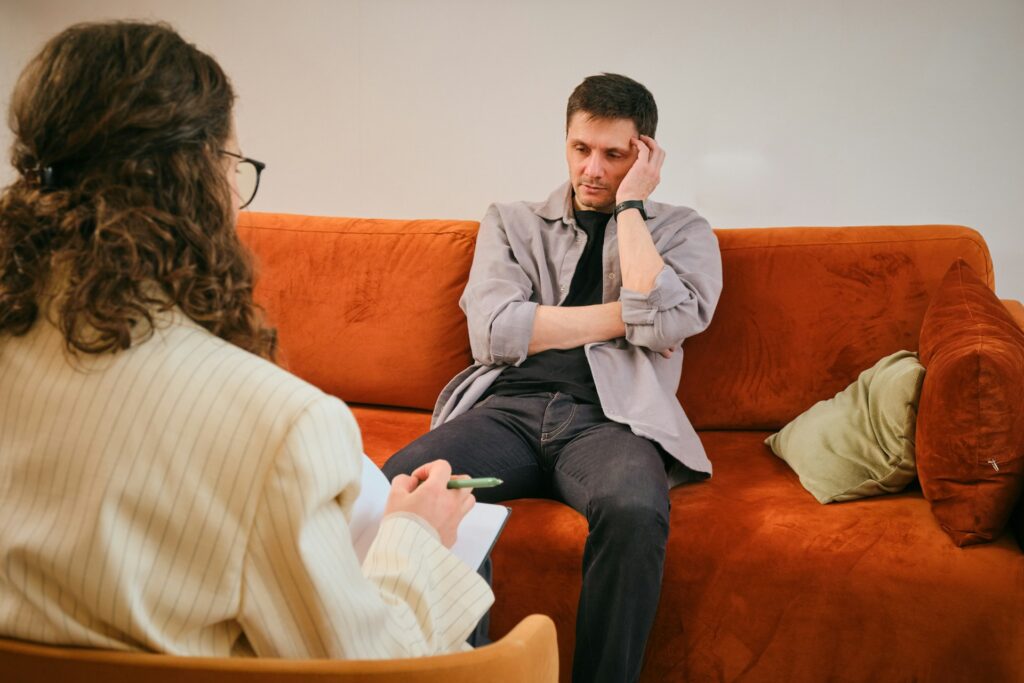Therapy isn’t just for crisis moments, contrary to popular belief.

It’s for anyone who wants to better understand themselves, break unhelpful patterns, or find healthier ways to cope. But often, people wait until they’re completely overwhelmed before reaching out. Sometimes the signs are subtle. Sometimes they’re loud. Either way, needing support isn’t weakness—it’s wisdom. Here are some signs that it might be time to talk to a therapist, and why doing so can be a powerful move for your mental health.
1. You feel stuck in the same patterns.

If you keep repeating the same emotional cycles—whether it’s toxic relationships, burnout, avoidance, or self-sabotage—it’s worth exploring why. Patterns like these often have deep roots, and therapy helps you spot the origin and start to shift things at the core. It’s not about fixing you; it’s about helping you understand what’s really driving your behaviour so you can respond with more choice, not just autopilot reactions.
2. Your coping strategies aren’t working anymore.

What used to help—numbing out, staying busy, venting to friends—just doesn’t cut it now. You feel overwhelmed, even when doing everything you used to rely on. That’s a strong signal your emotional bandwidth needs more structured support. A therapist can help you build new tools that are rooted in your actual needs, not just temporary relief. It’s about creating sustainable ways to manage life, not just surviving it.
3. You’re constantly anxious, but don’t know why.

Sometimes anxiety is obvious. Other times, it’s a quiet tension in your body, racing thoughts you can’t shut off, or a constant sense that something’s “off” even when life looks fine on the outside. Therapy can help you unpack what’s beneath the surface and teach you how to work with your anxiety, not just suppress it. Often, the simple act of naming your fears makes them easier to manage.
4. You’ve been through something painful and haven’t processed it.

Grief, trauma, heartbreak, or any major life shift can leave emotional debris behind. You might think you’ve “moved on,” but find yourself unexpectedly triggered, emotionally numb, or emotionally flooded by it months later. Therapists can help you give language to pain that’s been buried. Processing the past doesn’t mean reliving it—it means creating space to heal from it properly.
5. You feel emotionally numb or disconnected.

If nothing excites you, nothing moves you, and you feel like you’re just going through the motions, that’s not laziness or indifference—it’s emotional shutdown. A lot of times, it’s your brain trying to protect you from feeling too much. Therapy helps reconnect you to yourself. It’s a place to feel again safely, without being judged or rushed. That reconnection can be the first real step back to feeling alive again.
6. Your relationships are suffering.

Maybe you keep having the same fights, withdrawing without meaning to, or feeling resentful and misunderstood. Emotional overwhelm often leaks into our relationships in ways we don’t recognise at first. Therapists don’t just help with internal struggles. They can help you build healthier boundaries, communicate more clearly, and show up more intentionally in the connections that matter to you.
7. You’re constantly exhausted—mentally, physically, or both.

When you’re carrying unprocessed stress, unresolved emotions, or internal conflict, it drains your energy in ways you might not even realise. You sleep but still feel tired. You rest but never feel restored. That kind of exhaustion isn’t always solved by self-care or time off. Sometimes, it’s emotional fatigue, and therapy is where you can start offloading the weight you’ve been silently carrying.
8. You’re functioning, but not really living.

You’re getting your work done, replying to messages, doing all the “right” things, but you feel disconnected, uninspired, or like you’re just waiting for something to shift. You’re surviving, not thriving. Therapy can help you reconnect with purpose, curiosity, and emotional alignment. It’s not just about crisis—it’s about helping you feel like a fuller version of yourself again.
9. You’re dealing with big life changes.

Transitions—whether exciting or devastating—can stir up a lot. New jobs, breakups, becoming a parent, coming out, losing someone, or even “positive” change can destabilise you emotionally in ways that catch you off guard. Talking it through with a therapist helps you process not just what’s happening externally, but how it’s changing your identity internally. Therapy gives you space to land emotionally during times of upheaval.
10. You find yourself self-medicating.

If you’re relying heavily on alcohol, food, scrolling, or any behaviour to numb discomfort or manage emotions, it’s a sign your internal world needs more attention than it’s getting. Therapy gives you a safe, structured space to explore the feelings you’re trying to escape, and helps you build new ways of coping that are actually rooted in healing, not distraction.
11. You’re overly critical of yourself.

If your internal voice is constantly judging, shaming, or second-guessing you, it can wear down your confidence, your mood, and your sense of self. This self-criticism often comes from old wounds you’ve never had the chance to challenge. Therapists can help you build a kinder, more realistic relationship with yourself—one where self-compassion doesn’t feel like a foreign language. That shift alone can be life-changing.
12. Your usual support system isn’t enough.

Friends and family are valuable, but they’re not always equipped to help you process deeper emotional pain or mental health challenges. Sometimes you need someone who isn’t in the middle of your life to help you make sense of it. Therapists offer objectivity, training, and a judgment-free space that can make all the difference when you feel overwhelmed or misunderstood. You don’t have to outgrow your support system, but sometimes, you need to expand it.
13. You just feel like something’s off.

You might not be able to explain it. You just know you don’t feel like yourself. You’re more reactive, more tired, less hopeful, or just emotionally out of sync, and it’s been that way for a while. You don’t need a crisis to justify getting help. If something feels off, that’s enough of a reason to talk to someone. Therapy doesn’t just help you “fix” something. It helps you understand yourself better. And that, in itself, is worth showing up for.


